|
|
|
Sort Order |
|
|
|
Items / Page
|
|
|
|
|
|
|
| Srl | Item |
| 1 |
ID:
140323
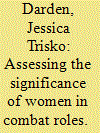

|
|
|
|
|
| Summary/Abstract |
What should we know about the roles of women in armed conflicts? I review the existing literature on women’s roles in regular and irregular conflicts to identify gaps in our understanding of the significance of female combatants. I draw on contemporary and historical cases of women’s combat participation across world regions and, in so doing, I challenge existing assumptions about the limits of women’s participation in armed conflict. Examining women as a group and expecting conflict to affect this group in predictable and easily identifiable ways only reinforces existing assumptions about women and war. To understand the range of motivations underlying women’s decisions to fight or to not fight, we should give greater attention to opportunity structures and other social conditions rather than simply assuming that women have different incentives than men.
|
|
|
|
|
|
|
|
|
|
|
|
|
|
|
|
| 2 |
ID:
140319
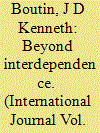

|
|
|
|
|
| Summary/Abstract |
China’s economic and politico-military development is placing considerable strain on the established framework of the trilateral relationship between itself, the United States, and Australia. Specifically, China’s rise is generating security concerns that are politicizing economic relations between the three states. A more guarded approach to economic collaboration will transform trilateralism, which up to now has been characterized by the scope allowed for the discrete pursuit of security and economic relations. This will force political authorities to carefully consider their policy priorities and further strain relations between the states, as well as supporting a more cautious approach to China on the part of the United States and Australia.
|
|
|
|
|
|
|
|
|
|
|
|
|
|
|
|
| 3 |
ID:
140325
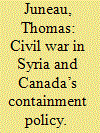

|
|
|
|
|
| Summary/Abstract |
The civil war in Syria has caused the deaths of more than 230,000 civilians and combatants, has led to one of the largest refugee crises in recent memory, and has destabilized the Levant. It therefore represents an extraordinarily challenging foreign policy conundrum. A wide variety of responses—ranging from the imposition of no-fly zones to doing nothing—have been considered in Ottawa and in allied capitals since 2011. Each one, however, raises potentially significant challenges.
This article explores how Canada has considered those alternatives. As is systematically the case for a non-great power, Canada’s policy options were shaped more by deliberations in allied capitals—especially Washington—and only thereafter by actual developments in Syria. After laying out Canada’s interests relative to the war in Syria, the article describes four policy alternatives that Canada has faced since 2011, as seen through the lenses of liberal pacifism, liberal interventionism, isolationism, and containment. Among this menu of deeply flawed options, containment has steadily emerged as Canada’s de facto approach. That approach has been correct: it is the least bad course of action available since it best allows Ottawa to protect and promote its interests. Nevertheless, Canada could take additional steps to implement a more comprehensive containment framework.
|
|
|
|
|
|
|
|
|
|
|
|
|
|
|
|
| 4 |
ID:
140326
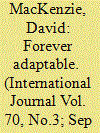

|
|
|
|
|
| Summary/Abstract |
The United Nations (and the associated specialized agencies, commissions, and committees that make up the “UN system”) turns 70 this year and, as it has at every major anniversary, it faces another round of demands for its reform. Looking back at its history, it is clear that the UN is not as good at “reform” as it is at “adaptation”—reinventing itself with each generation to meet changing global challenges. Indeed, it could be argued that because the organization responds to the demands of its members and focuses its attention on those issues selected by the members, since 1945 the UN has always reflected its time—and the interests of its member-governments—and adapted to the changing world around it. It is likely to continue doing so in the future and, in this way, it remains forever adaptable.
|
|
|
|
|
|
|
|
|
|
|
|
|
|
|
|
| 5 |
ID:
140320


|
|
|
|
|
| Summary/Abstract |
For more than two decades, the Financial Action Task Force (FATF) has been the central governance network for developing anti-money laundering policies. It serves as a prototype of a new form of governance, linked to soft law, peer reviews, and expert advice. Literature on the FATF, however, rarely questions the transferability of this model to other areas of global governance. Seeking to fill this gap, this article analyzes the networking activities that created and maintain the FATF. I argue that two major difficulties are particularly challenging for any global governance network: initiation problems and commitment problems. The article describes how the FATF’s members have overcome these difficulties and developed the network over time. It also shows that some tools and conditions that contributed to the FATF’s success are difficult to replicate for other networks. The conclusions outline some ways to overcome these challenges and present further questions for research.
|
|
|
|
|
|
|
|
|
|
|
|
|
|
|
|
| 6 |
ID:
140322
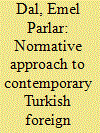

|
|
|
|
|
| Summary/Abstract |
This study explores the cosmopolitanism–communitarianism divide in normative international relations (IR) theory with a special focus on the apparent increasing weight of ethics and morality in Turkish foreign policy. First, it outlines the current debates in normative IR theory with a special focus on the divide between cosmopolitanism and communitarianism. Second, it asks whether Turkey’s foreign policy tradition, both in its discourse and its ethics, leans more toward cosmopolitanism or communitarianism. Then, it examines the slow rise of cosmopolitanism in Turkish foreign policy in the 2000s, with particular reference to the ruling political party in Turkey, the AKP (the Justice and Development Party). Finally, it examines the cosmopolitan/communitarian dilemma that the AKP government faces in the context of the Arab Spring, and specifically the Syrian civil war.
|
|
|
|
|
|
|
|
|
|
|
|
|
|
|
|
| 7 |
ID:
140324


|
|
|
|
|
| Summary/Abstract |
Often seen as an interest of environmental lobbyists and advocates, the development and implementation of new forms of energy capture has real security implications as well. This policy brief explores those implications. Focusing primarily on the military’s contribution to security and how energy capture affects the tactical, operational, and strategic levels of planning and execution, it argues that more needs to be done, and that future policies must be better designed, diversified, and focused on de-coupling.
|
|
|
|
|
|
|
|
|
|
|
|
|
|
|
|
| 8 |
ID:
140321
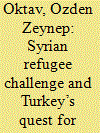

|
|
|
|
|
| Summary/Abstract |
This article examines the Syrian refugee challenge as a case study in order to understand the inherent contradictions evident in Turkey’s efforts to exert normative power in the Middle East. The article is divided into two sections. The first part examines how Turkey has attempted to transform itself from a country that has in the past been accused by elements in the West of “lacking [the] standards of [a] civilization” into a candidate for full European Union (EU) membership. The second part assesses the three main challenges to Ankara’s efforts as they are revealed through its response to the Syrian refugee crisis.
|
|
|
|
|
|
|
|
|
|
|
|
|
|
|
|
|
|
|
|
|